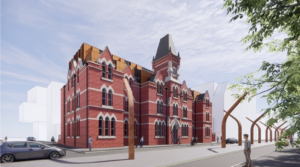Pieces of the same puzzle
 Why does our approach to housing rough sleepers with complex needs differ from the approach for people with autism and learning disabilities, writes Liz Zacharias, senior consultant at Campbell Tickell.
Why does our approach to housing rough sleepers with complex needs differ from the approach for people with autism and learning disabilities, writes Liz Zacharias, senior consultant at Campbell Tickell.
Housing First is a model that supports homeless people with multiple and complex needs to access and maintain independent housing.
These multiple and complex needs are generally defined as: having spent a long time rough sleeping, as well as suffering from diagnosed or undiagnosed mental health issues; substance misuse issues; and having a history of offending or experiencing domestic abuse. Often these factors come on top of adverse childhood experiences and/or trauma such as significant loss, bereavement, or abuse (in all its forms).
The theory is that these experiences create a deep-seated mistrust of services and other people. When this is combined with a cycle of repeated housing instability, it can mean that people become locked into chaotic behaviours as a way of coping and do not have space, time, or stability to recover from the various traumas that have beset them.
The case for Housing First
Although its use has grown in recent years, Housing First has had to continue to make its case – indeed there are three national pilots in the process of making that case even as you read this.
Put succinctly, the case is this: people with a profile as described above, deserve and need housing in the long term as a fundamental first stage of their recovery. Housing in this case is a therapeutic intervention, as well as a physical place that one can feel safe in and that can be a stable base to build a life from. The case that housing is the primary therapeutic intervention for such people must continue to be made to policymakers, funders, and even to social landlords.
Learning disability and autism
There is however another definition of complex needs: one that relates to learning disability and autism, and which in the main, doesn’t require the same case to be made for access to housing.
Indeed, the Transforming Care Programme – and its transposing into the NHS 10 year plan – is fundamentally constructed on the acceptance that people with complex needs have a right to live independently in the community with long-term support and care. Housing support and care are therefore provided to enable people with complex needs to develop their capacity for self-determination, maximising their independence and choice.
This is a policy imperative and a best practice alternative to long-term incarceration (I use the term by deliberate choice) in assessment and treatment units, or long-stay hospital services, or other disenfranchising support and care models.
The paradigm for learning disability and autism is one that sees the need to facilitate independence, choice, control, and a home that fits the individual’s needs as an unquestioned fundamental tenet. The case for access to housing does not need to be made – it is an accepted truth (and so it should be).
Challenges
The main stumbling blocks to providing homes for people with complex needs – whatever their background – are ones related to the availability of bespoke housing, and the ability and willingness of different agents to work together. Indeed, health players – Clinical Commissioning Groups, social care, housing supply, planning, housing developers, housing and care providers – must collaborate to achieve the required type and number of housing units, and fund the care and support needed to be sustainable for the people housed. And, of course this must all be done with value for money at the forefront.
‘The main stumbling blocks to providing homes for people with complex needs – whatever their background – are ones related to the availability of bespoke housing, and the ability and willingness of different agents to work together.’
Meeting needs
Ultimately people with complex needs need a stable home and long-term support – albeit delivered within a framework that encourages and facilitates maximum independence and self-determination (or choice and control).
There is no argument about this for people with learning disabilities and/or autism. Just as there is no argument about the need for that support to be long-term or even whole-life support and care – even if it tapers as people become more independent.
These facts however, I would argue are also true for ‘chaotic’ rough sleepers with complex needs. They are people who need long-term and probably whole-life support to recover from an accumulation of adverse life experiences. Many may be able to achieve much greater levels of independent living, however the road is likely to be long. Full independence, with no recourse to support is highly unlikely. Years on the street will have compromised their physical as well as their mental health and they are more than likely to need care interventions, as well as housing and support.
Paradigm shift needed
So why is it then for this group that our approach is based on the individual not needing any support at all within say five to seven years? Carrying on with this fallacy is dooming us all to failure. Why not adopt the same paradigm for Housing First clients, as for learning disability and autism?
Accept that clients with complex needs require long-term stable housing support and care if they are to have any hope of thriving and maximising independence choice and control over their lives.
If we did this then the accepted truth would be that ALL people with complex needs require long-term housing and long-term support and care to maximise their independence.
Photo Credit – Pixabay












